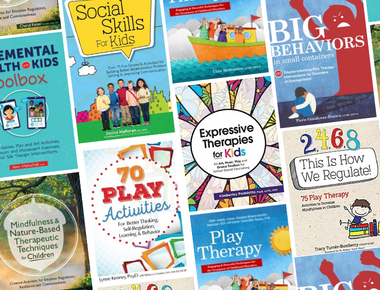8 Must-Have Play Therapy Books for Therapists Who Work with Young Clients
These books will change up your sessions with your young clients
PESI Team

“Children use play and imagination to explore the world and to make sense of what they see, hear, and experience. Play strengthens the connections in the brain and supports intellectual, physical, emotional, social, and creative processes. It fosters problem-solving and builds social relationships. The process of healthy attachment involves the creation of a secure base, usually with parents, from which the child can explore the wider world while knowing they have a safe relationship to which they can periodically retreat. When emotional events occur in children’s lives, their primary method for understanding them is to play about them.” - Clair Mellenthin, LCSW, RPT-S, in Play Therapy: Engaging & Powerful Techniques for the Treatment of Childhood Disorders.
Young clients don’t always have the words to explain their emotions or the traumas they’ve gone through. Play therapy helps to engage the child in the therapeutic experience and lets them express themselves in the best way they know how—by playing!
PESI’s selection of play therapy books provide valuable, evidence-based information on working with this special group of clients—along with interventions and activities you can bring into your own sessions with children and adolescents. From the new therapist to the seasoned veteran who’s looking to bring something new to their play therapy repertoire, these books are sure to change up your sessions with your young clients.
Young clients don’t always have the words to explain their emotions or the traumas they’ve gone through. Play therapy helps to engage the child in the therapeutic experience and lets them express themselves in the best way they know how—by playing!
PESI’s selection of play therapy books provide valuable, evidence-based information on working with this special group of clients—along with interventions and activities you can bring into your own sessions with children and adolescents. From the new therapist to the seasoned veteran who’s looking to bring something new to their play therapy repertoire, these books are sure to change up your sessions with your young clients.
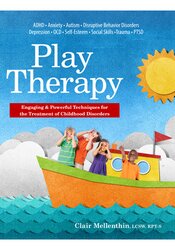
Play Therapy: Engaging & Powerful Techniques for the Treatment of Childhood Disorders
Clair Mellenthin, LCSW, RPT-S
Discover why play therapy works and how to use it to treat childhood mental health challenges like ADHD, anxiety, autism, disruptive behavior disorders, depression, OCD, PTSD, trauma, self-esteem, and social skills. Play Therapy is filled with dozens of powerful play techniques adapted for use in individual, family, and group therapy, for schools, and at home.
Clair Mellenthin, LCSW, RPT-S
Discover why play therapy works and how to use it to treat childhood mental health challenges like ADHD, anxiety, autism, disruptive behavior disorders, depression, OCD, PTSD, trauma, self-esteem, and social skills. Play Therapy is filled with dozens of powerful play techniques adapted for use in individual, family, and group therapy, for schools, and at home.
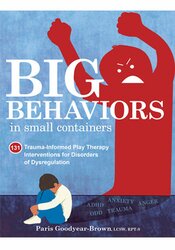
Big Behaviors in Small Containers: 131 Trauma-Informed Play Therapy Interventions for Disorders of Dysregulation
Paris Goodyear-Brown, LCSW, RPT-S
When it comes to working with dysregulated children, sometimes the biggest behaviors come in the smallest containers. From tantrums and defiance to self-injury and withdrawal, even the most skilled professionals find themselves focused on extinguishing the troubling behavior rather than stepping back to ask: What is the underlying emotional need? In Big Behaviors in Small Containers, you’ll find 131 practical, fun, and ready-to-use play therapy interventions that shift the paradigm around problematic behaviors to allow for therapeutic growth and healing.
Paris Goodyear-Brown, LCSW, RPT-S
When it comes to working with dysregulated children, sometimes the biggest behaviors come in the smallest containers. From tantrums and defiance to self-injury and withdrawal, even the most skilled professionals find themselves focused on extinguishing the troubling behavior rather than stepping back to ask: What is the underlying emotional need? In Big Behaviors in Small Containers, you’ll find 131 practical, fun, and ready-to-use play therapy interventions that shift the paradigm around problematic behaviors to allow for therapeutic growth and healing.
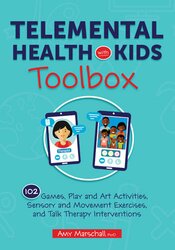
Telemental Health with Kids Toolbox: 102 Games, Play and Art Activities, Sensory and Movement Exercises, and Talk Therapy Interventions
Amy Marschall, PsyD
As clinicians increasingly make the switch to remote therapy, the need for kid-friendly telehealth interventions has become more crucial than ever. Telemental Health with Kids Toolbox includes an arsenal of flexible, creative, and fun virtual interventions that will allow you to provide effective, evidence-based treatment while still capturing the attention of even the youngest of clients.
Amy Marschall, PsyD
As clinicians increasingly make the switch to remote therapy, the need for kid-friendly telehealth interventions has become more crucial than ever. Telemental Health with Kids Toolbox includes an arsenal of flexible, creative, and fun virtual interventions that will allow you to provide effective, evidence-based treatment while still capturing the attention of even the youngest of clients.
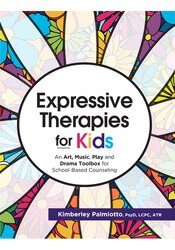
Expressive Therapies for Kids: An Art, Music, Play and Drama Toolbox for School-Based Counseling
Kimberley Palmiotto, PsyD, LCPC, ATR
Expressive arts therapies can help children communicate problems, process emotions, and develop solutions, in a comfortable, non-threatening way. Expressive Therapies for Kids contains over 85 art, music, play and drama directives to use in school or a therapy office.
Kimberley Palmiotto, PsyD, LCPC, ATR
Expressive arts therapies can help children communicate problems, process emotions, and develop solutions, in a comfortable, non-threatening way. Expressive Therapies for Kids contains over 85 art, music, play and drama directives to use in school or a therapy office.
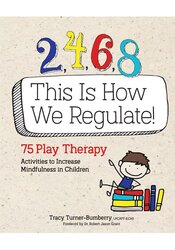
2,4,6,8 This Is How We Regulate: 75 Play Therapy Activities to Increase Mindfulness in Children
Tracy Turner-Bumberry, LPC, RPT-S, CAS
Learning verbal mindfulness strategies can be difficult for children and adolescents, let alone when kids have autism, anxiety, ADHD or other emotional regulation issues. Use these 75 simple, playful and on-point interventions that combine mindfulness, expressive arts and play to help kids achieve greater self-regulation, focus more and stress less.
Tracy Turner-Bumberry, LPC, RPT-S, CAS
Learning verbal mindfulness strategies can be difficult for children and adolescents, let alone when kids have autism, anxiety, ADHD or other emotional regulation issues. Use these 75 simple, playful and on-point interventions that combine mindfulness, expressive arts and play to help kids achieve greater self-regulation, focus more and stress less.
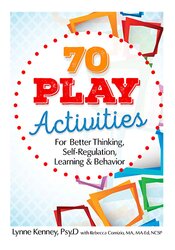
70 Play Activities for Better Thinking, Self-Regulation, Learning & Behavior
Lynne Kenney, PsyD
Packed with worksheets, handouts, and guided scripts with step-by-step directions, this definitive resource will put you to the top of your play game. With activities designed to improve thinking, self-regulation, learning and behavior, your tool kit will be full and your creative brain will be inspired to craft your own meaningful exercises. Play now, play later... with 70 Play Activities for better brain function and learning.
Lynne Kenney, PsyD
Packed with worksheets, handouts, and guided scripts with step-by-step directions, this definitive resource will put you to the top of your play game. With activities designed to improve thinking, self-regulation, learning and behavior, your tool kit will be full and your creative brain will be inspired to craft your own meaningful exercises. Play now, play later... with 70 Play Activities for better brain function and learning.
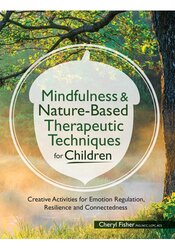
Mindfulness & Nature-Based Therapeutic Techniques for Children: Creative Activities for Emotion Regulation, Resilience and Connectedness
Cheryl Fisher, PhD, NCC, LCPC, ACS
Whether you’re in the therapy office, a classroom, in the city, or the countryside, using nature-based activities with children is always possible, and incredibly therapeutic. By integrating these activities with mindfulness, therapists and educators can harness the power of both treatments, and help children become calm, alert and happier human beings.
Cheryl Fisher, PhD, NCC, LCPC, ACS
Whether you’re in the therapy office, a classroom, in the city, or the countryside, using nature-based activities with children is always possible, and incredibly therapeutic. By integrating these activities with mindfulness, therapists and educators can harness the power of both treatments, and help children become calm, alert and happier human beings.
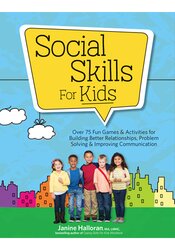
Social Skills for Kids: Over 75 Fun Games & Activities for Building Better Relationships, Problem Solving & Improving Communication
Janine Halloran, MA, LMHC
Bestselling author Janine Halloran has created a treasure chest of practical lessons to teach social skills by playing. Social Skills for Kids shares the best play experiences for kids to learn and practice social skills in real places and situations. This rich resource includes reproducible, step-by-step plans for how to play, alternatives to each activity, and debriefing questions to reinforce learning.
Janine Halloran, MA, LMHC
Bestselling author Janine Halloran has created a treasure chest of practical lessons to teach social skills by playing. Social Skills for Kids shares the best play experiences for kids to learn and practice social skills in real places and situations. This rich resource includes reproducible, step-by-step plans for how to play, alternatives to each activity, and debriefing questions to reinforce learning.


